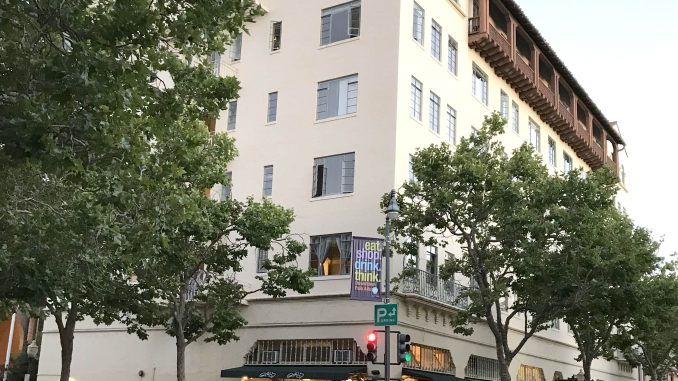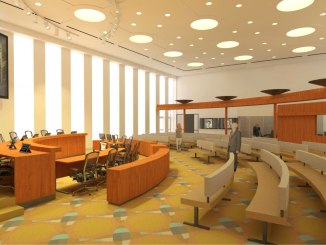
BY ALLISON LEVITSKY
Daily Post Staff Writer
Executives from the Chicago-based hotel chain buying the residential Hotel President in downtown Palo Alto — booting out the residents of its 75 studio and one-bedroom apartments — held private meetings with City Manager Jim Keene and several members of City Council before closing the deal, city leaders confirmed.
But none of them saw an opportunity to intervene in the sale, which threatens to take dozens of $2,000/month apartments off the market so that AJ Capital Partners can turn the 1929 building back into a hotel at 488 University Ave.
The company’s Graduate Hotels division is focused on restoring historic buildings and runs boutique hotels in college towns nationwide.
Keene said he warned the buyers that evicting tenants from some of the most affordable market-rate apartments in the housing-starved city would be “the big issue” for them.
Now, city employees are researching what kind of application or proposal the buyer may be submitting to the city, and what the city’s leeway is in responding, Keene said.
“It’s an open question for us right now,” Keene told the Post. “The city’s taking the potential of this conversion quite seriously and I’ve asked our staff to really review, in advance of getting any sort of formal submission from these folks, what the situation is.”
Parking concern
Some concerns have been raised over the building’s small handful of parking spaces, a shortage which may require the hotel to operate a valet service or rent out parking spaces in neighboring lots.
Councilwoman Lydia Kou said the eviction would displace “a lot of people who are community contributors.” She said she was concerned that the transition to a hotel would make parking more difficult downtown.
Irony
But Councilman Adrian Fine pointed to what he called “the ridiculous myth of our situation.”
While the loss of housing is regrettable, the city code would prevent such a tall, dense apartment building, with so few parking spaces, from being built today, he pointed out.
“A bunch of Palo Altans are going to be (upset) that this wonderful, affordable apartment building is going to be turned into a hotel,” Fine told the Post. “If we like the Hotel President, we should be building more of them.”
Fine has pushed to change the city’s zoning code to allow less parking and higher densities.
Last week, City Council approved a 57-unit apartment building at 2755 El Camino Real with 1.2 parking spaces per unit. The project has won support from dense, transit-oriented housing advocates and protests from those who think the “car-light” model will push tenants’ second cars out onto neighboring streets.
Councilman Cory Wolbach echoed Fine’s sentiment.
“It’s obviously a loss of dozens of housing units that are exactly the kind we need in Palo Alto: smaller-sized, reasonably priced, transit-oriented, without a ton of unnecessary parking,” he told the Post.
A loss for the community
Mayor Liz Kniss noted the tight-knit community bonds at the Hotel President. Tenants describe the building as a “dorm for adults,” where they bring soup to sick neighbors and hold welcome parties on the roof when a new tenant moves in.
Most of the apartments’ kitchens don’t have an oven or stove, so tenants get by with mini-fridges and hot plates.
“I didn’t even realize there was that communal kind of spirit there, and I think that when you lose that, you lose a little something in your community that you can’t replace very easily,” Kniss told the Post. “It shows what density can do. That’s much taller than 50 feet, much denser than what we currently allow, and look how well it’s working.”
Kniss and Councilwoman Karen Holman both touted the positives of a restored hotel. Holman said she believed the chain took historic restoration seriously, and Kniss said it might be nice to have the hotel’s new amenities downtown, including a lobby cafe and enhanced rooftop garden.
Could tenants remain?
And Holman suggested one possible solution which was once commonplace at old hotels: allowing some of the tenants to remain in their apartments to incorporate long-term housing with hotel rooms.
“I just think it’s really important that we look at this as a community,” Holman told the Post. “As we welcome AJ Partners to our community, I think it would behoove AJ Capital to also listen to our community. Not every community is the same, and the issues that we have here may not be the same issues as in Chicago.”
Councilman Tom DuBois said he had also raised concerns about housing in his meeting with the buyers.
“Obviously, the city’s going to have to look at this carefully,” DuBois told the Post. “I hope the new owners will do right by the residents.”
Relocation money
The buyer has offered residents $3,000 and ordered them out by Nov. 12.
DuBois speculated that some newer tenants “may be very happy with the relocation offer.” For others, like the woman who has lived at the building for 30 years, the eviction likely comes at a greater cost.
Councilman Greg Tanaka hadn’t heard about the sale when contacted yesterday (June 14).
Vice Mayor Eric Filseth said little when asked about the purchase.
“I think arguably the city makes money off hotel revenue, but I’m sorry to see some of the housing go,” Filseth said.




It figures that our council would be meeting with the buyers behind closed doors. What other secret deals do they know about.
In every council campaign, every candidate says they favor “transparency”. Here’s a situation where transparency could have really helped these residents. If the council members who were in on this secret would have been transparent and warned about the sale, the tenants could have sued and held up the closing. Instead, council decided to go along with the developer and keep this secret until the sale closed. This fall, the candidates should be honest and tell people that they’ll be transparent on the easy things but not on important stuff like this.
No law is being broken here. The zoning is CS, just like the Garden Court next door, so it’s fine by zoning. It’s private property, so the city should keep its hand off and let market forces prevail.
Adrian Fine has a point, you couldn’t build housing like this today, a six storey building and all. If we’re serious about housing we need taller buildings because they’re not making any more land.